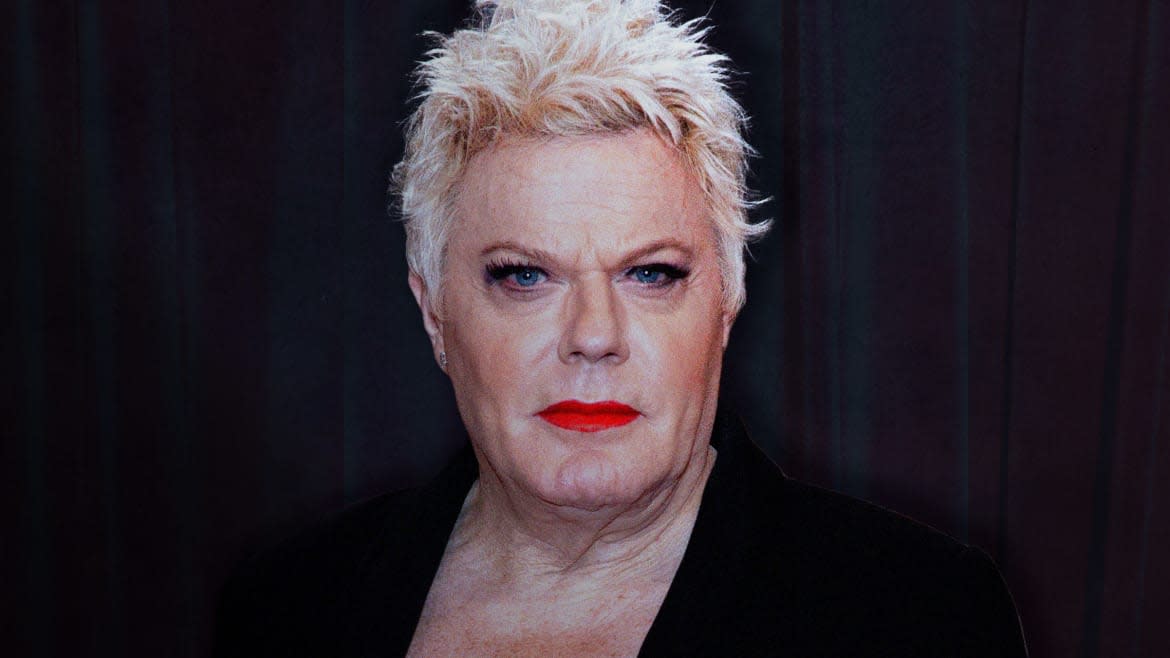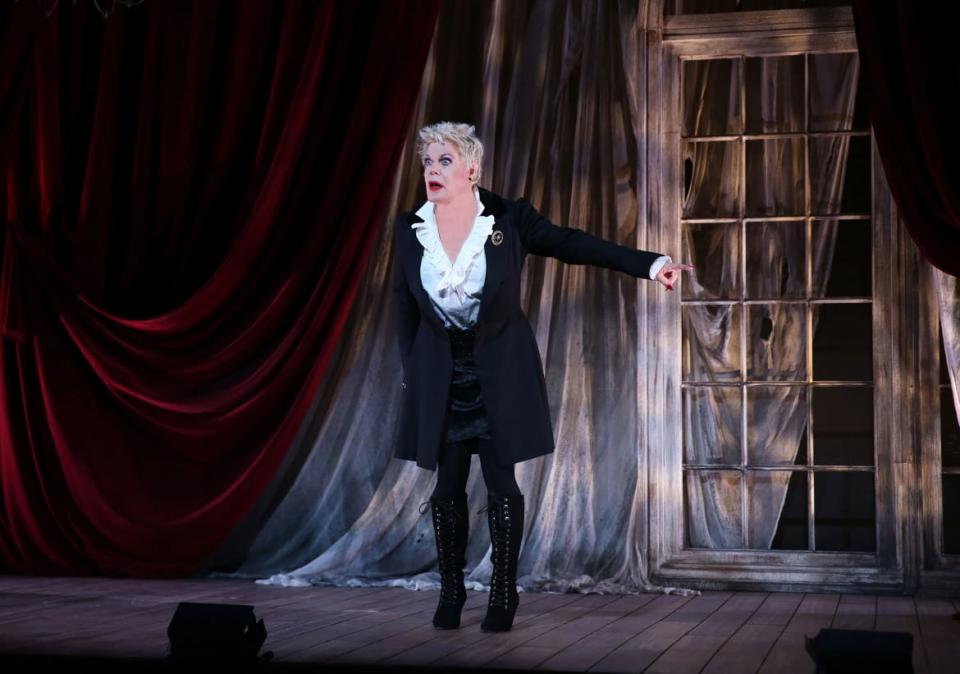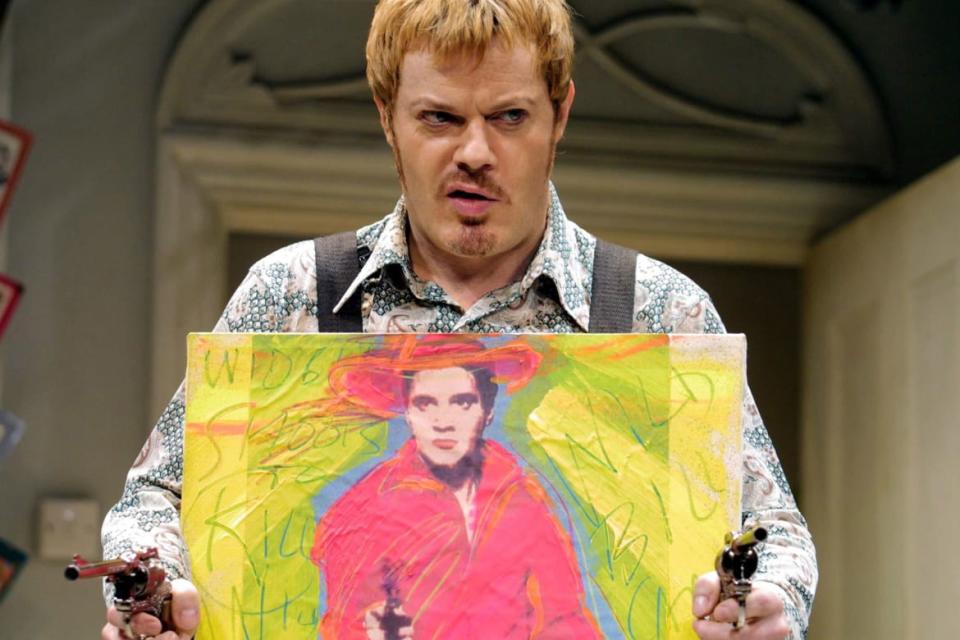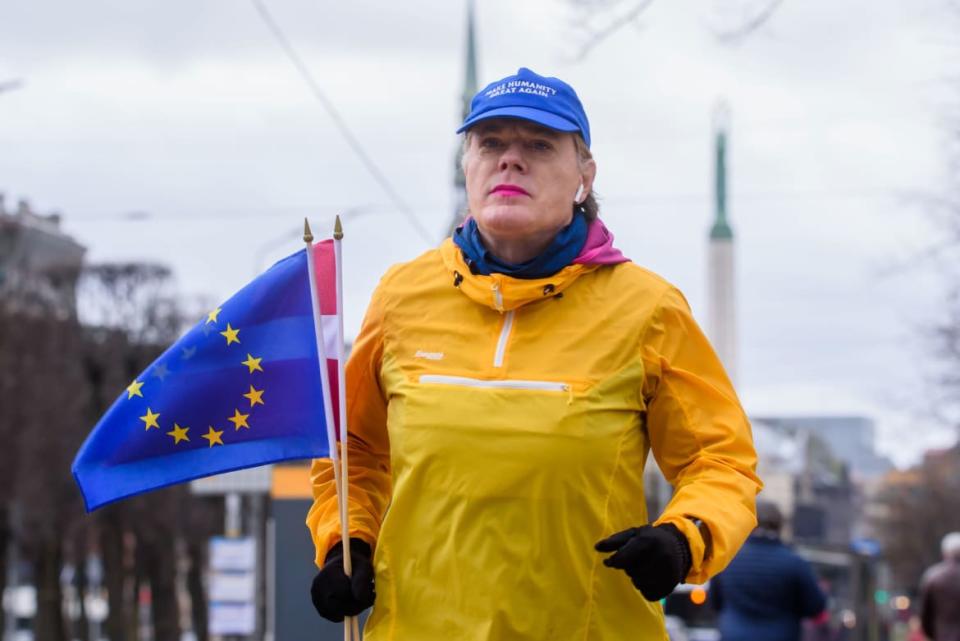Eddie Izzard on Beating Anti-Trans Hate, a New Run for Office, and Being ‘Relentless’

- Oops!Something went wrong.Please try again later.
- Oops!Something went wrong.Please try again later.
New York City will always do New York City, and so as Eddie Izzard drank from a cup of black coffee talking about playing every character in a new adaptation of Charles Dickens’ Great Expectations, the most effective ways to conquer transphobia, and her plans for a one-woman Hamlet, a familiar sonic cavalcade of siren upon siren—fire engines, ambulances, police cars—passed by our restaurant.
Mid-sentence as silence briefly reigned, Izzard looked past this reporter’s face, and smiled. A man walking by was half-waving, half-raising his arm in support and appreciation towards her. It was happily jolting, as Izzard, 60, had just been talking about the transphobic abuse she had received on the streets. Through all challenges, Izzard said she had simply “carried on.” Her career in stand-up comedy and drama, on stage, TV and film, in marathon running and more recently in politics, is one of determined, blithe relentlessness—of doing things her way, and screw those who abuse, mock, or demean her.
“It’s always good to be back in New York,” Izzard said, counting it among the cities she has come to think of as home. She is performing Great Expectations, adapted by her older brother Mark—playing Pip, Estella, Miss Havisham, Magwitch, and everyone else—until Feb. 11 (The Greenwich House Theater, 27 Barrow Street), traversing genders, ages, and imagined locations on a relatively unadorned stage.
Don’t Just Tweet #TDOR, Show Up For Trans People!
Izzard received a Tony Award nomination for her performance in A Day in the Death of Joe Egg on Broadway in 2003, and discussions are already underway with a view to move Great Expectations to Broadway and the West End, she revealed. “Bigger rooms seem to give it a space for more imagination, especially when we did it at the magisterial De La Warr Pavilion in Bexhill” (Izzard’s British hometown).
Izzard recalled coming to New York in the mid-1990s, with people wondering if America would understand her sense of stand-up humor; that the differences between American and British humor would be too great.
“Robin Williams said smart people would get it,” Izzard said of what was then known as alternative humor, which subsequently seeped into the cultural mainstream. “After one show they were talking about me touring America. Monty Python was popular here. How could they get Python and not me? I was very influenced by Python.” She won two Primetime Emmys for her 1998 show, Dress to Kill.
Mark’s adaptation of Great Expectations began life at the Edinburgh Festival, with Izzard reading Dickens’ novel from the page, “like Jackanory on steroids,” as she put it—referring to the popular BBC storytelling series for children of the 1970s and ’80s. Slowly, she weaned herself off the script, memorizing more and more of it, learning the text from the back, until now she knows it all. She has even removed “the safety net” of her production manager following the script from the side of the stage, ready to prompt if needed.

Eddie Izzard in Charles Dickens’ Great Expectations at The Greenwich House Theater in New York.
“Sometimes I do screw up a line to get to a word, and I need to go back and circle around,” Izzard said. “I’ve been training myself to be able to speak Dickensian, 1800s-type speech. I’ve been avoiding words like ‘OK,’ and any slang that feels modern.” The performance spans all the melodrama of Dickens, studded with light bits of humor, and a kind of intimate intensity as the plot progresses and characters inquire of each other through Izzard, which adds a third lens of inquiry by virtue that every word is said by her.
Playing all the characters is like “playing a chess game with yourself,” Izzard said, unlocking characters and exploring conversations. Richard Pryor, one of Izzard’s comedic touchstones, used a similar narrative construction in his stand-up, and Izzard hopes how she evokes Great Expectations helps the audience watching “paint in” all the locales in their minds. For Izzard, it is an act of pure storytelling with echoes to the ancient roots of stories told around flickering campfires. In interview, she is as ranging as the stand-up comedy that made her famous, occasionally (and needlessly) apologizing for “going off on tangents.”
Izzard recalled her parents reading stories to her when she was young. Of her dyslexia, Izzard said: “It didn’t feel frustrating. I didn’t know anyone reading faster. I just thought reading was tough. I didn’t know I was dyslexic until my thirties. As a kid, ‘I Spy’ went on for hours: I spelled ‘ceiling’ with an S and ‘curtains’ with a K. When you’re dyslexic you want to spell phonetically, so there are no silent Q’s, hidden things, or letters shoved together that don’t behave.” Scripts were never difficult to master, Izzard said. She developed “a big mental map” from doing stand-up, and memorized words accordingly. It helped that her first roles were small, and her stand-up was conversational.
Izzard’s off-Broadway run began pretty sharpishly after she failed to secure the nomination to represent the Labour Party as the parliamentary candidate for Sheffield Central in the north of England, the city where she had attended university. She has previously mulled running to be Mayor of London, and has twice run unsuccessfully for a seat on Labour’s National Executive Committee.
“The people on the streets of Sheffield were absolutely fantastic,” Izzard told The Daily Beast, even if she had also faced transphobia too. “I just soldier on,” she said. “It’s been almost 40 years since I came out. I just keep pushing forward, and if anyone wants to join the slipstream behind me that’s great. I will find another seat.”
So, she is planning to try to become an MP representing another constituency? “Oh yes, and I would like it to be in the north. I plan to keep my feelers out, and keep fighting away.” Izzard expects this search for a seat to take place in 2023, prior to an expected 2024 General Election (if Rishi Sunak’s premiership continues unbroken until then).
Izzard wants to become an MP to help change political culture. “I define myself as a radical moderate. I do radical things with a moderate message. There are a lot of good people in politics, and a lot of people who think, ‘Why don’t we just lie instead?’ Boris Johnson and Donald Trump are the Tweedledum and Tweedledee of pants-on-fire politics. They’re like, ‘I’m gonna lie,’ then they lie so quickly that while you’re arguing over one lie, they lie again. Then suddenly we have a heap of lies. It’s the fascist playbook: lie and lie and lie. There has to be consequences for lying, even though right now there seem to be very few consequences for lying.”
“I am a relentless person. I just keep going”
Izzard says she will choose when and where to run next for office; and her solo theater projects give her the autonomy to be fully in charge of her political and entertainment world calendars. In choosing Great Expectations, Izzard said, she had first been looking for an audiobook to perform. She had also wanted to assert control over artistic choices so often denied to her—by playing every character and doing this is a solo production, she has full ownership of it. No more “you’re not right for this role.”
“Do I like sitting inside Pip?” she mused of the Dickens characters she plays. “He’s crashing and burning for some of the time. I don’t like that. The desperate hankering after money and gentility he goes through, I don’t like the idea in myself. I’m curious about Estella. Some of that is trans. As a young boy I wondered what it would be like to be a young girl, and everyone reacts to this young girl’s looks, but she doesn’t feel anything because of what Miss Havisham has done. I like to play the ice-queeniness of her. I didn’t think I would get the chance to play her. I thought I would only get to play trans roles or straight male roles, but in this I can play any role. I can play Estella, and I hope humanize Miss Havisham, and find journeys in them both. People don’t necessarily give me these gigs, so in this production I am taking them all. It’s punishment for my ego in a way.”
Izzard recalled being asked as a younger actor what part in Shakespeare’s The Comedy of Errors she wanted. “A large role on stage all the time, he gets off with all the girls and kills all the bad guys,” she had replied. “I was given the jailer, who was handcuffed to the lead character, so I was on stage all the time.”
Of whether casting opportunities had improved for trans actors, Izzard told The Daily Beast, “I think we are at a tipping point where people realize that a van driver, firefighter or doctor character can be trans, and it doesn’t need to be explained why they’re trans, or their transitions. They can just be trans. If you like what a trans actor is doing, let them play the role.”
Contemplating the tide of transphobia in the U.S. and U.K., Izzard said that a gay actor friend had said the situation mirrored the level of prejudice faced by LGB people 20 years ago. “He said that had dissipated eventually, and perhaps trans people would face, and have to go through, the same thing. I think he might be right. When I came out I was considered a non-person. It was toxic. It felt like people did not feel I should have the right to be a citizen. People were screaming at me on the street, and no one was backing me up. But I am a relentless person. I just keep going.
“Now, some discussions are happening. There are positive and negative moments. We’ll get through this. The right wing are trying to stir up culture wars, pushing buttons on people’s fears, just as they have always done. It will go on until we get it stopped. It’s just a matter of time. New people are coming in, we’ll repeal bad laws, move on, and just keep reaching. Women have had to do it, people of color had to do it. Trans people have to keep going. I just ignore it. I don’t have a magic button, but I have carried on for 37 years.
“To any trans person, indeed to LGBTQ people generally, I say: live your lives and please continue over-achieving. Being your authentic self is great.”
“Like any LGBTQ person, your battles are very personal”
Izzard told The Daily Beast she had become “a fighter” after her mother died when she was 6. At the time she and Mark were at the same boarding school, “so I could sort of cling to him in the early days.” But two years is a yawning gap between children at that age, and Mark moved to another school, so Izzard had to learn “how to fight your own patch. I cried a lot over my mother’s death. Then I realized strategically in the battle of wills of the children in my peer group that if you cry, it’s over, it’s lost. I had a fight and cried, and thought that once you start crying you can’t turn it off.
“I learned to stop crying when I was 11. It wasn’t over my mum, but I had this thing about never crying again, and stopped crying and became a dead person. I think a lot of boarding schools churn out a lot of emotionally dead people. I didn’t cry again till I was 19. There was scar tissue over all my emotions, which I had to rip open again.”
Izzard’s father was devastated by his wife’s death. “He used to keep the radio on all night for company. There were four people in the house, and suddenly he was on his own. It was not good for him, or good for us.”

Eddie Izzard in Peter Nichols’ play A Day in the Death of Joe Egg at the Comedy Theatre, London.
Izzard knew she was trans at around 4 or 5. She grew up loving football and wanting to be in the forces. “Being trans didn’t show itself. I had no ‘transdar.’ I leaned into all the boy things. No one guessed. I fancied girls. It was a big secret.” At university, there was a cross-dressing party night, and this was peak New Romantic era, providing a perfect cover for Izzard to dress and use makeup as she desired.
In London in 1984, Izzard went to a TV/TS (transvestite/transsexual) support group in Highbury and Islington in North London, which helped, encouraging her “to throw on a dress and makeup and have some tea and coffee.” Next was the challenge of going out on to London’s streets dressed in women’s clothes. “I got so stressed. I started sweating, thinking people were looking at me. I know when I looked in the mirror I didn’t look well put together, and the dress was from a catalog. I had no coping skills. All of that was going on in the early years. It took some time to get on top of it, become more confident, and develop a language to talk about myself and a whole load of things. I needed help to get started, then like any LGBTQ person your battles are very personal. You might know other people, but in the end you are on your own.”
Initially, Izzard called herself TV (“Oh, you’re a television,” wags would say). When people would say “it was about the clothes,” Izzard told them it was not. “You’re trying to express yourself in a certain way. I realized early on I was transgender, which to me had many groupings attached to it. Early on I called myself an ‘action transvestite,’ or ‘executive transvestite.’ I was taking this hard word and trying to spin it positively. When ‘trans’ came into the language, I realized that’s essentially where I am. People said to me I couldn’t be a transvestite if I was trans. People shouted at me into the bread bin, they shouted at me online.
“I didn’t see it as a huge change, calling myself transgender after calling myself transvestite. ‘Trans’ is the thing. Being transgender is the overall grouping, and from very early on I realized that was the grouping I was in. ‘Gender-fluid’ was another helpful term: that’s how I felt. I think it’s down to genetics and chromosomes. For me, it’s in me, it has never moved since I realized it was there. The far right always say LGBTQ people choose to be who we are. No. I knew from very young that I was trans.”
There was “lots of hurling of abuse on the streets” early on, and one big fight. “I stood my ground. I didn’t go down,” Izzard said. “And if people hurl abuse at me, I hurl it back. It helps being relentless. People of weak character exist on the right. They want to scare you. Just refuse to be scared, and carry on.” When it comes to pronouns, “I prefer ‘she/her.’ I don’t mind ‘he/him.’”
In the early days of working on television, Izzard would be asked by producers what she would be wearing. “I would tell them, ‘Clothes.’” Izzard wonders if she has lost out on jobs because of being trans, with the vague reason offered that “they were going in a different direction. It doesn’t matter. I just carry on.”

Eddie Izzard, English stand-up comic, actor, writer, and political activist runs an 18th marathon distance in a row (part of a project to run 28 marathons in 28 days and 28 countries) with the slogan “MakeHumanityGreatAgain” in Riga, Latvia on Feb. 18, 2020.
Another side of this relentlessness is Izzard’s running of many marathons for charity, which Izzard hoped would help raise money, and inspire others, trans and not, who have never run marathons before. Izzard is presently single, “between relationships.” The right person would have to be “strong-willed,” she said. “It’s cool. Some people have to be in a relationship. I don’t have to be. There are certain times when I want to be more in a relationship, but at this point I’m OK.”
Izzard has already done an open rehearsal for her next one-woman show, an adaptation of Hamlet. “I feel ridiculously relaxed playing him,” Izzard said, saying she was digging into the other characters—particularly Gertrude and Ophelia—“to make sure they punch out of the text. It’s easier with Hamlet, because Shakespeare allows him to say what he thinks. I want to make sure I honor those two female roles especially.”
The one-woman Great Expectations and Hamlet are not performative endurance tests, Izzard insisted. “No, it’s more like to give me roles to stretch myself theatrically and dramatically. It’s like, ‘You’re not the top of our list for these roles,’ and me saying ‘OK, I’ll do them all.’” It gives Izzard the power and sense of control of well-known film actors like Tom Cruise, who choose their own projects, and how those projects should be presented and crafted. “It gives me freedom,” Izzard said.
This “having a plan of full control” is important to Izzard, as she schedules film, TV, and theater projects around her next campaign to stand for public office in England. She feels “60 going on 30. The young and young at heart will save the world, and the old and old at heart will drag it down. Aging is not great, but I am doing more and more interesting roles. It’s all to play for.”
Izzard doesn’t have any dream roles. “I just like working with good directors and being challenged in each role that I do. I have to do stuff that really pushes me to an edge, out of my comfort zones.” There is that forthright relentlessness again. The embrace of challenge is Izzard’s lifelong animating focus—doing it all, proudly, stubbornly and inquisitively, her way.
Get the Daily Beast's biggest scoops and scandals delivered right to your inbox. Sign up now.
Stay informed and gain unlimited access to the Daily Beast's unmatched reporting. Subscribe now.

